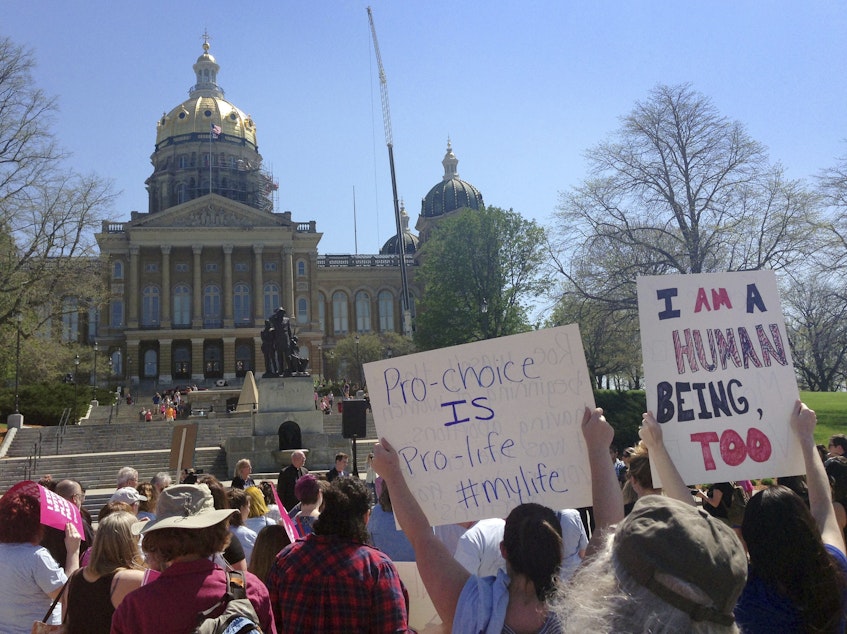Activists Brace For 2019 Abortion Rights Battles In the States

With a newly configured U.S. Supreme Court, the stakes are high for abortion rights battles at the state level. Abortion rights advocates and opponents are preparing for a busy year — from a tug-of-war over Roe v. Wade to smaller efforts that could expand or restrict access to abortion.
Supreme Court Justice Brett Kavanaugh is known for his conservative record on issues including reproductive rights. And with his confirmation, many abortion rights opponents see new opportunities to restrict the procedure at the state level.
"The pro-life movement has been talking about more pro-life-friendly courts for years, and we see Kavanaugh really tilting that balance," says Jamieson Gordon with Ohio Right to Life.
Activists in Ohio just pushed through a law banning a common second trimester abortion procedure called dilation and extraction. Gordon says her group is feeling optimistic, and working to pass more restrictions in the new year.
"It really has been encouraging for us knowing that if our bill ... got picked up to go to the court, that we would have a more favorable court," she says. "So I do think that we've seen the tide turn."
Sponsored
A "watershed moment"
Abortion rights advocates are also preparing for a wave of bills to be introduced in statehouses across the country, says Elisabeth Smith, Chief Counsel for State Policy & Advocacy at the Center for Reproductive Rights.
"We think this will be a watershed moment in terms of the number [of bills] that are filed, and then potentially the number that will actually be enacted in various states," Smith says.
She says advocates are working to protect abortion rights, repeal existing restrictions, and fight new efforts to limit access to the procedure.
"I think the specter of the Supreme Court will be behind both the pro-active bills — in terms of shoring up the right and access [to abortion] at the state level — and on the other side, I think states that are hostile to reproductive rights are going to be jockeying to be the state that sends a law to the Supreme Court," Smith says.
Sponsored
Tug-of-war over Roe v. Wade
Many abortion rights opponents say they're hoping to overturn Roe v. Wade, the 1973 decision that legalized abortion nationwide.
"States want their bill to be the one to go to the Supreme Court. They want to be the one," says Sue Liebel, state director for the anti-abortion rights group Susan B. Anthony List.
Possible test cases for Roe are already working their way through the courts – including an Iowa law banning abortion after a fetal heartbeat is detected, and one in Mississippi prohibiting the procedure after 15 weeks gestation.
Liebel says anti-abortion activists want to pass similar bills in as many states as possible.
Sponsored
"So I think they're hopeful; they're energized, and rarin' to go," Liebel says.
If Roe were weakened or overturned, more power for regulating abortion would fall to the states. Several anti-abortion groups are pushing to increase the number of states banning abortion after 20 weeks or earlier.
Meanwhile, lawmakers supportive of abortion rights in several states are sponsoring bills to guarantee the right to abortion in state law, in places including Massachusetts, Virginia, and even Texas, according to Smith, with the Center for Reproductive Rights.
"It's unlikely that [Texas] bill will pass," Smith says. "But I think more and more state advocates are bringing up this bill – either as a messaging vehicle, or to actually get it enacted."
Big steps, and small ones
Sponsored
NARAL Pro-Choice America is promoting those bills. But Deputy Policy Director Leslie McGorman says it is also working on incremental efforts to improve abortion access, including legislation allowing a broader range of medical providers — like nurse practitioners and physician assistants — to provide abortions in more states.
"We know that as long as abortion is sort of a one-off procedure, or care that's delivered in a standalone clinic and people sort of don't know what it is, that it's gonna be this part of health care that's sort of viewed that way, that's viewed as sort of marginal," McGorman says.
Abortion rights opponents are also continuing to pursue their own incremental strategy.
Americans United for Life has close to 60 model bills aimed at restricting abortion. Among them is the Abortion Reporting Act, which requires medical providers to submit detailed reports to health officials about abortion-related complications.
"This is really designed to make sure that women are informed about those abortion providers that are especially dangerous," the group's president, Catherine Glenn Foster, says.
Sponsored
Abortion rights advocates say the requirements are intrusive and vaguely defined. Planned Parenthood sued last summer to block a similar law in Idaho.
"There's also a big push to defund abortion facilities, to stop them from getting Title X funding," says Ingrid Duran, of the National Right to Life Committee.
It's already illegal for federal funds to pay for abortions in most cases, but anti-abortion activists want to ban organizations like Planned Parenthood, which offer abortions, from receiving any public money for reproductive health services. The Trump administration has proposed blocking such groups from getting funds through Title X, the federal family planning program for low income people; Duran says similar efforts are underway in many states. [Copyright 2019 NPR]


